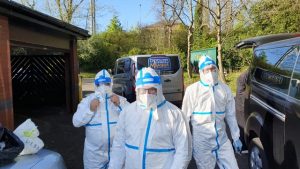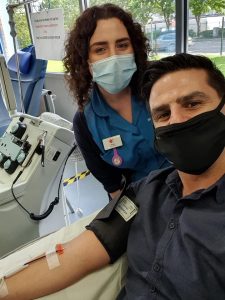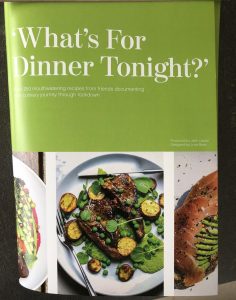
The People Who Do
Elaine Bermitz
The word ‘misaskim’ translates to English as ‘the people who do’. The people who volunteer for this organisation have been at the forefront of the last mitzvah that a person can do for another namely the respectful burial of the dead.
That they have never been busier is a sad outcome of COVID-19. During an average year they deal with around 180 deceased, providing advice, care and mourning accessories in order that families can have their departed prepared for burial, the service performed, and shiva arranged according to the unique Jewish customs.
In the four weeks around Pesach this year they dealt with more than half that number, around 8-9 people per day and in circumstances which they had never previously encountered. While other support organisations found it impossible to cope, Misaskim stepped in and, with the cooperation of Goldfine Funeral Directors were, by the end of the period running all the voluntary services related to Jewish death in Manchester.
Danny Smith, who is a deputy registrar for Bury Council and also a member of Misaskim, spoke about what this position meant: “We have no paid staff, just around 50 volunteers, all of them with day jobs, though some were furloughed at this time, and all of them were working full time in very high temperatures and wearing full PPE which we bought ourselves at all times. We were picking up bodies from hospitals, homes and care homes, from as far afield as Southport to Stockport, taking them into Manchester for tahara and returning them to communities for local burial.
“We helped those who had not been able to see their relatives at the end of their lives, due to hospital regulations and we attended funerals where there were not enough COVID-free people to make up minyonim. We helped and advised many people who needed release forms and protected a few who were faced with the threat of post-mortem. Where appropriate we Zoomed funerals so that families could have some opportunity to partake in the service and then arranged the shiva, advising how to allow people to contact them in the safest manner.
“Where necessary we provided low chairs for the mourners to sit on – all entirely plastic so that they could be thoroughly cleaned after use. At one point our warehouse was empty: every piece of equipment, van or prayer book was lent out or being used to transport bodies. As a deputy registrar I had never been so busy, and I never want to be again.”
They have emerged as an organisation, barely known or recognised outside the Jewish community to one who no longer have a need to explain to the emergency services who they are. Like Hatzola they are recognised and respected by hospitals and homes alike throughout the area, a fact which makes their job much, much easier.
To support Misaskim, visit Misaskim.co.uk/support-misaskim.

Tea and Chat
Elaine Bermitz
As a medical secretary in the NHS Mental Health Services, Denise Journo is only too aware of how important mental wellbeing is to people. She has been lucky enough to be working throughout the lockdown, but when walking with her husband Gerard, who had been furloughed, she wondered constantly about how others were coping with what was then an open-ended period of isolation. “I have never been keen on exercise, but love walking around Whitefield and talking to people we knew was very therapeutic. Connecting with people became so much more important” she said.
“With that in mind, and with the encouragement of Whitefield Hebrew Congregation, I started a Zoom group limiting the number of people per chat and offering them at different times of the day two or three times a week. I tried to include those who didn’t have a lot of contact with others and those who were living or working alone at home. Keeping the subjects light and varied meant that evening knew a little about the things discussed and could potentially find out a lot more.
“It is free, funny, supportive, often wise, sometimes serious and always convivial. We have men and women, singles and married people, older and younger people and all are welcome. In short if you can talk, you have the necessary tools to join in!
“The fallout from COVID-19 is by no means over yet, and the chats still taking place so if you want to contact me please ring my mobile on 07983 924 113, and I will find a group to suit you. I do have to say that I won’t be drinking tea each time though – that wouldn’t be practical!”
I asked Denise whether she had benefitted from what seemed such a simple, but absolutely essential idea: “Of course! I find that I think about what people have said and their comments come back to me for a good while after the chats. I also find that people are enjoying them and looking forward to them and that gives me a great deal of satisfaction. If every person teaches another person each to Zoom or WhatsApp, we will have a lot more connected people.”

Chava Art
JLife was excited to hear that local artist Chava Erlanger’s had released an uplifting new lockdown piece in support of the NHS. Chava’s Perspex bird – featuring the ubiquitous rainbow of hope – is a strikingly cheerful and poignant piece of wall art. The kaleidoscopic design will help households across the country to commemorate their time spent at home during lockdown.
The artist – whose previous work is on permanent display at Imperial War Museum North – hopes sales of the new piece, priced at £45, will raise vital funds for the NHS. Inspired by the most kitsch of British décor, three ceramic ducks flying across a wall, the artwork captures the hopeful side of the British public’s response to the COVID-19 pandemic.
With a nod to the symbolic dove of peace, sent from the ark by Noah to bring back news that the floods had ended, the 30cm motif cuts a vibrant and joyful reminder of an extraordinary period of modern history. As families begin moving tentatively away from the safety of home in the coming months, many will strive to keep hold of the lessons learnt in 2020 and a time spent living much more simply.
Artist Chava has been shielding at home for months to protect the health of her son. She says: “For many, lockdown has been a time of reflection. So many of us plan to make changes to our lives, to be happier, healthier, closer to loved ones and more engaged in our communities. There are lots of positives to take from this time, and my artwork is reflective of these hopeful intentions.”
Chava grew up in Israel during the Gulf War. As a fine artist, she uses art as a tool to help those going through traumatic life events: “Through my work, I examine the human response to disaster, both good and bad. We have collectively, globally, been through a trauma. Personally, I have been contemplating my own family history – the loss of my freedom of movement leading me to reflect on my grandmother’s experience during the Holocaust, which she survived. I am interested in the way we move from darkness to light.
“This piece focuses on the brighter side of our recent experience; the kindness and goodness of people, and the ways we come together to strengthen each other. As some restrictions ease, I hope that we’ll continue to think of each other and the need for continued focus to keep each other safe. My aim is to bring that feeling of hope and togetherness into our homes permanently.”
Chava’s artwork is available to buy from Chavaerlanger.com/online-store.

Yoni’s Blood Lifeline
Yonatan Levy, a local financial consultant decided to donate convalescent plasma to help in the fight to beat COVID-19. As someone who had recovered from the virus, he is now able to help with the national effort against the virus with just a short visit to his local blood donation centre.
Yoni said: “As a COVID-19 survivor with antibodies my plasma can be used to save the lives of sufferers in urgent need of medical help. I love the idea that I could be saving lives. Enough plasma was taken to be given to two COVID-infected patients who are in serious need.”
Blood plasma is a yellowish liquid that makes up about half your blood volume. After a virus, your plasma contains antibodies that are used to help fight infection. Convalescent plasma is the antibody-rich plasma of someone who has recovered from a virus, in this case COVID-19. The donation takes around 45 minutes and will separate plasma from the blood as you donate, in a process called apheresis.
The NHS currently needs donors who have had either a positive virus or antibody test. It is also important that donors have fully recovered from COVID-19, and that their body has had time to develop a good antibody response.
Yoni added: “The pain was bearable, and it always helps when they give you biscuits at the start and end. I’ll definitely be doing this again!”
To find out how you can help and donate, visit Blood.co.uk.

Dinner is Served
Lockdown was a stressful and strange time for many, with mealtimes oftentimes feeling more arduous than ever before to organise, despite being a renewed time for the household to spend some quality time together. In an effort to combat lockdown boredom, Jane Lazare created a Facebook group inviting local people to post what they were cooking that evening alongside impressive photos of their daily culinary creations.
The What’s for Dinner Tonight? FB page was soon inundated with recipe ideas and shopping tips during the height of the pandemic, and after the popularity of the group was reported by Angela Rippon on BBC’s daily HealthCheck UK Live, Jane was inspired to created a physical recipe book, documenting as many of the posted recipes as possible. Sifting through the pictures and favourite recipes posted by members of their foodie experiments was a colossal task, but Jane was grateful for a project in the midst of lockdown: “It was a lot of hard work as I had never embarked on anything like this before, but it was part of a project for lockdown that gave everybody in the Facebook group a huge distraction during those first weeks.”
With the help of designer Liora Bean, Jane set about putting 250 recipes in some form of order, eventually organising them week by week, meaning that you could follow along from week one, whipping up delightful dishes created by fellow community members. Slowly but surely, after contacting group members for detailed recipes and ingredient lists, the collection was complete: “I had a full vision in mind for the book and with Liora’s expertise the book was finally created.”
Interest in the book soon soared and the decision was made to sell the collection in aid of three charities close to Jane’s heart: Mind UK, Victim Support and ALYN Hospital in Jerusalem. The hardback book has already proved incredibly popular – over £15,000 has been raised so far (at the time of reporting) – so Jane is excited for contributors, sponsors and supporters of the project alike to finally get their hands on it: “A lot of people have bought it for a gift. It is not just a recipe book but more of a personal memento of strange time. There’s lots of vibrant colour and humour and photographs from the lockdown, a poem and even a letter from my 10-year-old step-granddaughter.
“It’s something that people might want to buy and keep on the bookshelf to one day show their children or grandchildren about when life stood still in 2020.”
To purchase a copy, priced at £25, email whatsfordinnertonight320@gmail.com or janelazare@gmail.com.

